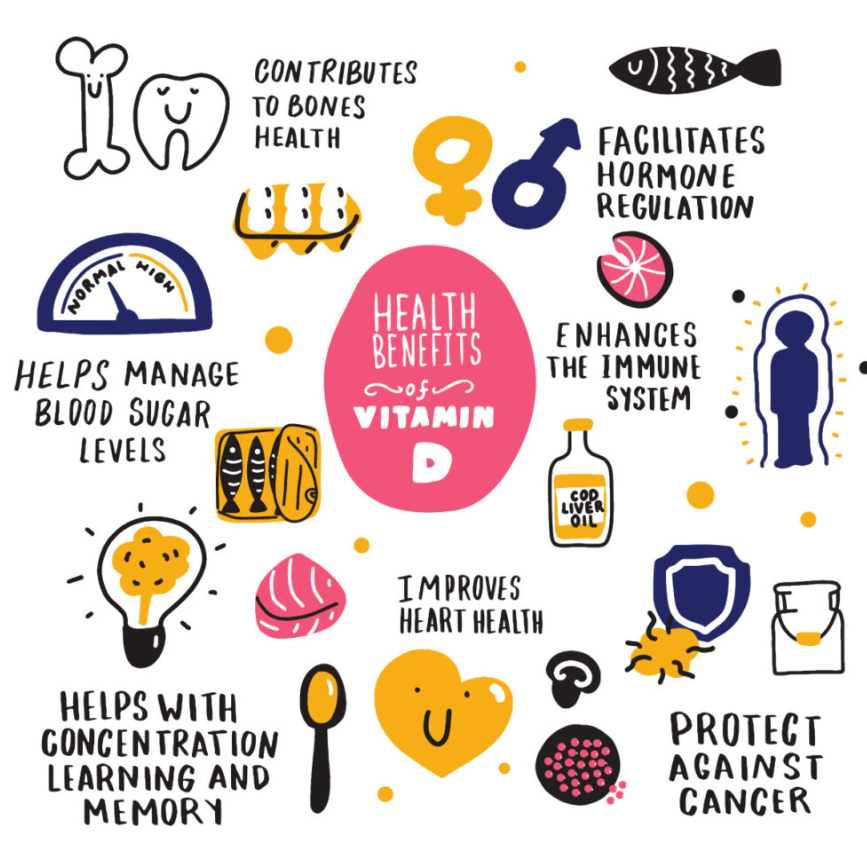Vitamin D3, also known as cholecalciferol, is a fat-soluble vitamin that plays a pivotal role in multiple physiological functions in the human body, with numerous benefits specifically for women. One of its primary functions is to aid in the absorption of calcium and phosphorus, essential minerals for bone health and prevention of osteoporosis, a condition that women, especially post-menopausal, are more susceptible to. In addition, studies have shown that Vitamin D3 may have a protective effect against certain types of cancers, including breast and ovarian cancer, which predominantly affect women.
Moreover, it acts as an immune modulator, fortifying the immune system, and can potentially lower the risk of autoimmune diseases, many of which are more prevalent in women. Vitamin D3 also has a role in mood regulation and may help alleviate depressive symptoms. Notably, Vitamin D3 deficiency has been linked to fertility issues in women, and its supplementation could enhance reproductive health. Therefore, maintaining adequate levels of Vitamin D3 through exposure to sunlight, diet, or supplementation could significantly contribute to the overall health and well-being of women.

What is Vitamin D3
Vitamin D3, also known as cholecalciferol, is a type of vitamin D which is an essential nutrient for our bodies. This vitamin is synthesized in our skin when it is exposed to sunlight, specifically ultraviolet B radiation. It can also be obtained from certain foods like fatty fish, beef liver, cheese, and egg yolks. Supplements are another source of obtaining Vitamin D3. Its primary role is to aid in the absorption of calcium and phosphorus from the food we consume, thus playing a vital role in bone and teeth formation and maintenance. Furthermore, Vitamin D3 is known to enhance the function of the immune system and reduce inflammation. It is also involved in cell growth modulation, neuromuscular function, and mood regulation.
Deficiency of this vitamin can lead to various health issues such as rickets in children, osteomalacia in adults, and increased risk of chronic diseases like cardiovascular disorders and certain types of cancer. However, excessive intake of Vitamin D3 can also be harmful, causing nausea, vomiting, weakness, and kidney problems. Therefore, it is essential to maintain an appropriate balance of this vitamin in our bodies. A balanced diet, adequate sun exposure, and supplements, if needed, can ensure the required levels of Vitamin D3.
Benefits of Vitamin D3 for Women
Vitamin D3 is an essential nutrient for women’s health with numerous advantages. It aids in the absorption of calcium and phosphorus, which are key elements for maintaining healthy bones and teeth. Women are prone to osteoporosis, especially in their post-menopausal phase, and an adequate intake of Vitamin D3 can reduce this risk significantly. Besides bone health, Vitamin D3 plays a vital role in maintaining a healthy immune system. It has been linked to lowering the likelihood of developing flu and helps fight off infections. It also contributes to reducing the risk of multiple sclerosis and heart disease. Research suggests that this vitamin may have a role in preventing and treating certain types of cancers like breast and colon cancer. Furthermore, Vitamin D3 is beneficial for mental health as it can help alleviate symptoms of depression and anxiety, common issues faced by many women globally.
Women with Polycystic Ovary Syndrome (PCOS), a common hormonal disorder, can benefit too as Vitamin D3 can improve fertility and regulate insulin levels. Moreover, during pregnancy, adequate levels of Vitamin D3 are necessary to support the development of the baby’s skeletal system and promote overall health. Lastly, in terms of skin health, Vitamin D3 helps rejuvenate the skin by promoting cell growth and repair, reducing inflammation and dryness, leading to a more youthful and radiant complexion. Therefore, given its array of benefits, it is essential that women incorporate an adequate amount of Vitamin D3 in their diet or through supplements.

Sources of Vitamin D3
Vitamin D3, also known as cholecalciferol, is an essential nutrient that our bodies need to maintain optimal health. It plays a crucial role in various bodily functions, including the promotion of calcium absorption for healthy bones and teeth and the support of the immune system. While our bodies can produce Vitamin D3 naturally through direct exposure to sunlight, there are additional sources for this vital nutrient. One of the primary sources of Vitamin D3 is fatty fish, such as salmon, mackerel, and sardines. These types of fish are rich in Vitamin D3, making them an excellent addition to the diet. Other seafood, like oysters and shrimp, also provide a significant amount of this vitamin.
Additionally, certain types of mushrooms, particularly those exposed to ultraviolet light, are another source of Vitamin D3. Other foods, like beef liver, cheese, and egg yolks, contain smaller amounts of this nutrient. For those who find it challenging to get enough Vitamin D3 from sunlight or food sources, there are also supplements available. These supplements can be particularly beneficial for individuals who live in northern latitudes where sunlight is limited during the winter months, or for those who have certain dietary restrictions or health conditions that limit their ability to absorb or convert Vitamin D3 effectively.
Fortified foods are another source of Vitamin D3. Many products such as milk, orange juice, and breakfast cereals are often fortified with this vitamin to help individuals meet their daily needs. It is important to note that while these food sources can contribute to our Vitamin D3 intake, the most efficient way for the body to produce this nutrient is still through direct sun exposure. However, it’s essential to balance sun exposure with the risk of skin damage. Always consult with a healthcare professional to determine the best ways to meet your Vitamin D3 needs.
Symptoms of Vitamin D3 Deficiency
Vitamin D3 deficiency can manifest itself in several ways, reflecting its vital role in a multitude of bodily functions. Often, the symptoms are subtle and can be easily overlooked. Fatigue and a general sense of tiredness, even after adequate rest, is one of the most common signs of Vitamin D3 deficiency. This can be accompanied by frequent bouts of illness or infections, as low levels of this nutrient can impair the immune system’s ability to combat viruses and bacteria. Individuals with insufficient Vitamin D3 may also experience bone and back pain, as this vitamin is crucial for maintaining bone health. Additionally, depression can be a symptom related to deficiency, highlighting the nutrient’s role in mood regulation. Other potential signs include impaired wound healing, hair loss, and muscle pain. It’s also worth noting that some people may not present any noticeable symptoms, even when their Vitamin D3 levels are low. Therefore, regular blood tests to monitor vitamin levels can be beneficial. If you do experience these symptoms, it’s crucial to consult a healthcare professional who can provide a proper diagnosis and treatment plan.
